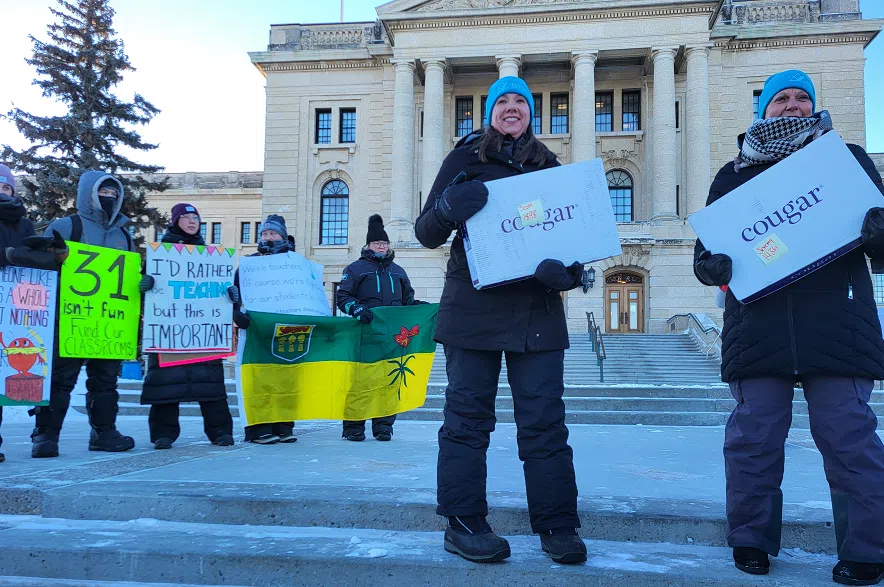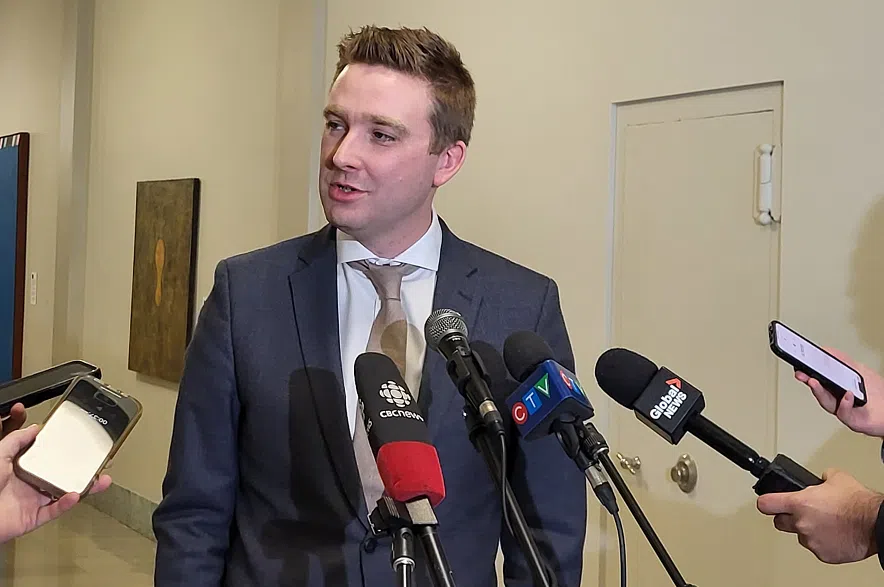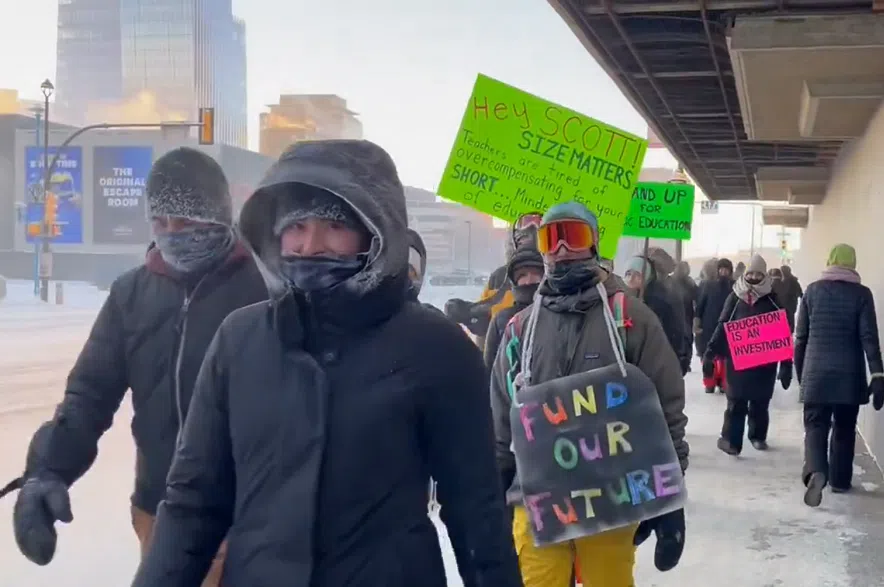Saskatchewan education minister Jeremy Cockrill isn’t happy to see teachers walk off the job in a one-day, province-wide strike Tuesday.
“It’s disappointing it’s gotten to this point,” said Cockrill.
“I think we know from the last couple (of) years through the pandemic that it’s better for kids to be in school than it is for kids not to be in school.”
While negotiations are at an impasse, Cockrill is adamant, at some point, a deal will be completed at the bargaining table.
The problem is, no new talks between the Saskatchewan Teacher’s Federation or the province are actually scheduled.
STF president Samantha Beecote has said that union is trying every option to get back to bargaining.
“The last thing any teacher wants is for negotiations to impact the school year, so we are exhausting every possible option to get government back to the table,” Becotte said in a statement.

Samantha Becotte, president of the Saskatchewan Teachers’ Federation, pickets with teachers in front of the Legislative Building in Regina during a single-day teacher strike on Jan. 16, 2024. (Daniel Reech/980 CJME)
“At every turn, teachers have said that committees are getting us nowhere on these urgent issues, and a new deal must include items to address class size and complexity. Government remains intransigent, even after conciliation. This is not bargaining; they are making decisions based on politics and student learning is suffering for it.”
Read More:
-
Sask. creates fund to support teaching innovations amid contract dispute
-
Conciliation report says teachers can negotiate class complexity: STF
However Cockrill remained steadfast in his direction to address class size and complexity with school boards and school divisions, rather than with the STF.
“We are working with school divisions. We announced a pilot project last week that’s working with eight specific school divisions on specialized support classrooms… if that pilot is successful… if we start to see progress and improvements in outcomes… we would absolutely look at expanding that pilot out to more divisions and more schools,” he said.
On the picket lines Tuesday, Saskatoon teachers spoke about the issues they’re seeing in schools.
Shaylynn Mackay-Robinson, a teacher at Holy Cross in Saskatoon, said class sizes are growing exponentially, and educators are not receiving adequate funding or the support required to take care of their students.
“Time’s up for not supporting education,” she said.
Aly Strunk, a teacher at West Mount School, said it’s becoming more and more difficult to manage overcrowded classrooms, especially with so many students having complex needs. Her current class has almost 30 students, she noted.
“I’ve been doing my job for 10 years, and this year is probably the worst it’s been,” Strunk said.
Strunk said a class of around 20 would be more manageable, and called on the government to invest in education by hiring more teachers and building more schools.
“Complexity is a thing,” she said, “We can’t do our job. I’m a babysitter, and I am a poorly paid babysitter at the moment.”
Teacher Jason Agar said striking is a way to influence the provincial government to make a difference for students.
“What matters is the kids in the classroom getting a better education, and it starts from the top down from our government,” Agar said.
Agar said it was frustrating for the situation to get this far, but said sometimes job action like Tuesday’s strike are necessary.
“It could be a positive. It could be an eye-opener and it could honestly change the future of our education for the better, so it could be good,” he said.
Another teacher, Kelley Meyer, said educators are tired of working in overcrowded classes and sometimes have to deal with violence in classrooms as well.
“Let’s hope after today, (the government) know that we’re serious,” she said.
“Teachers are a group of hardworking professionals, and we are dedicated. People don’t realize how much we do every day, and what we need to do what we’re doing.”
Meyer added that teachers were braving the cold for the future of kids in the province.
“We’re all risking frostbite until the contract gets right,” she said.
Cockrill said he expects to see improvement in class sizes, although he didn’t specify how that would be accomplished.

Jeremy Cockrill, Saskatchewan’s education minister, speaks to reporters in Regina. (Daniel Reech/980 CJME)
The STF has said that if no progress with the province is made, strikes or other forms of action could escalate. But Cockrill says deeming teachers an essential service is not something he’s considered yet.
“That’s not a conversation we’ve had,” he said.
Neither is potentially going to binding arbitration.
“I want to get a bargain deal done. I want to get a deal done that at the end of the day we can move forward with,” he added.
Cockrill also suggested one of the reasons a deal has not yet been struck was because of STF salary demands.
“The teacher’s union has said this is not about money. Yet they continue to demand a 23.5 per cent increase over four years. We’re just not prepared to accept that deal on behalf of Saskatchewan taxpayers,” he added.
Still, Cockrill said he hopes the STF comes back to the bargaining table.
“I don’t know if I’m just an eternal optimist or a millenial, but I do believe we’re going to get back to the table here eventually, get a deal done,” he said.
The last time teachers went on strike was the spring of 2011.
–with files from 650 CKOM’s Mia Holowaychuk











